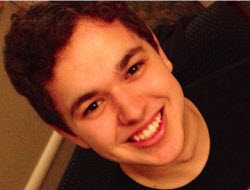Thoughts Upon Reading the News of Lincoln's Death
By Brendan McDermott
7.5.13. There are points in American history where everything comes to a screeching halt. Where the collective consciousness drops everything and refocuses on one person, one place, one time. Flashbulb events, the type of things people will say “I remember where I was when” about.
The first of these national pauses happened April 14, 1865, with the first assassination of an American president. The fact everyone still knows the story: the location, the shooter, the scream of “Sic Semper Tyrannis!,” the death in the house across the street, is a testament to this collective moment in our nation’s history, a day required in history books, a well-woven segment in the patchwork quilt that is American culture.
Recently however, the collective consciousness has been overfocused. In the last year it’s jumped from Joplin, to Aurora, to Long Island, to Sandy Hook, to OKC, and those are just the ones remembered offhand. The rise of media and technology has made tragedy more accessible, but less connectable. Subjected to a 24-hour news cycle world of loss and pain, the nation becomes exhausted and inattentive: sees the headline, feels the appropriate emotion, steps back, and moves on, returning to their unaffected lives, overexposed to the point of unfeeling.
Worse than the loss of emotion, is the loss of action. When in the right conditions, a tragedy can become a rallying point, a force of momentum to enact real, lasting change. The outpouring of support a community receives after a disaster, the rebuilding process, even the enacting of new legislation to prevent seeing the same headlines a year from now.
There’s no doubt that America can give. Telethons, text message donations, or dropping off things we don’t need to provide for those who have lost everything to wind or water. That sort of giving feels good. The cameras illuminate the need, we give what we can, and the next time it ticks across television, we feel good instead of hollow.
The latter ones rarely make headlines. It’s what happens when the cameras go off, when ‘Breaking from Joplin, MO’ simply becomes Joplin, MO. When Sandy Hook is no longer the name of a shooting but the name of a school. When OKC is seen in the NBA and not on CNN. Relative anonymity, the pieces left behind. When a public is overwhelmed by disaster, we can’t fix one before the next happens. The entire process becomes truncated, dictated by national attention. We live in the information age, yet when the headlines dry up, our well of knowledge, and resolve, dries up.
In that way, we are no different from April 15th 1865. We are a country dominated by our media. They choose what to report on, and in that way they choose what we think is important. If news channels had ignored a suspicious shooting in Eastern Florida, the name Trayvon Martin wouldn’t have been seared into the national vocabulary. If the issue is too large to ignore, like the Supreme Court decisions about DOMA and Prop 8, they still decide the tone. If showrunners and newscasters hadn’t covered gay marriage as a civil rights issue, would we think it is? Some would argue that the news is a reflection of America, but it seems more like a whip, spurring viewers on, telling them what to care about, and how to think about issues. And when the whip lets up, so do the viewers, seemingly forgetting the issues because there’s no spotlight focused on them.
This transitions into why I want to be a journalist. I want to be the one who keeps the cameras on: the update on Haiti five years later, the coverage of gun legislation between major shootings, the holding of politicians to positions they’ve publicly taken. There is an incredible power in the press, and I want in.


 Brendan McDermott graduated from St. Louis University High School, Class of 2013. In the fall, he will be a student at the University of Missouri, where he will study journalism.
Brendan McDermott graduated from St. Louis University High School, Class of 2013. In the fall, he will be a student at the University of Missouri, where he will study journalism.